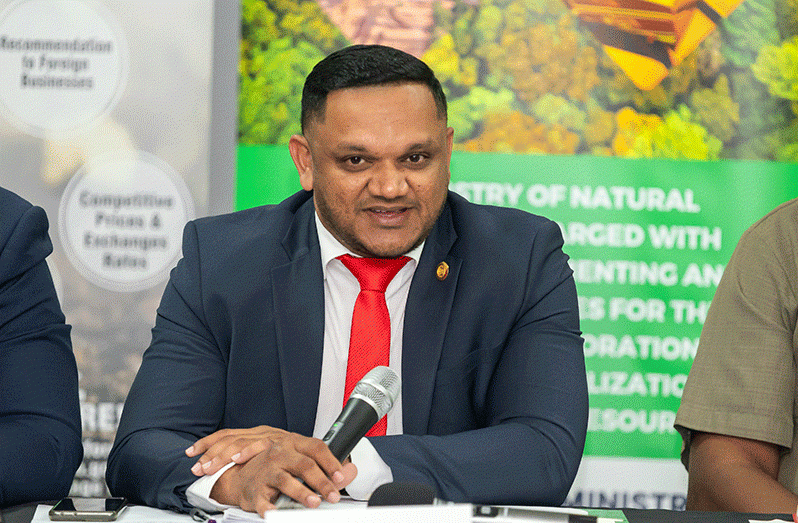Minister Bharrat says there will be public consultations before Local Content Act is revised
STRICTER requirements for the application of a Local Content Certificate are expected soon to curb the issue of “fronting” in the sector.
This is according to Minister of Natural Resources Vickram Bharrat, and Director of the Local Content Secretariat Dr, Martin Pertab during the ministry’s end-of-year press conference on Tuesday.
According to Bharrat, fronting, or what he called, “rent a citizen”, has been one of the major issues the Local Content Secretariat is confronting.
He said: “We have seen many Guyanese, who I know personally, who you know personally, many companies advocating to have a local content legislation in place so that Guyanese can benefit from the oil-and- gas sector. Today, sadly, we are seeing some of those same individuals fronting for international companies; setting up shell companies.”
This, Dr. Pertab said, has caused the secretariat to move towards having more in-depth due diligence done prior to issuing certificates to companies.
Against this backdrop, he said many persons have reached out to the ministry, and some even to the media, complaining about the long process to get their certificates.
However, Minister Bharrat said that they need to ensure that enough due diligence is done to eradicate the issue of fronting, and move away from that.
Further to this, he appealed to Guyanese to not be engaged in these activities, and noted that if they want to truly be involved in the sector and provide goods and services, it must be done the right way.
“Of course, there are penalties in the legislation, and if people continue to do so, we will move towards instituting serious penalties for fronting,” Bharrat added.
Meanwhile, Dr. Pertab told the conference that while over 800 companies have been registered at this stage, they have observed that some Guyanese are registering for the purpose of having a certificate.
The local private sector, he added, has been very vocal against fronting, and together they have discussed ways of addressing this. The main approach, Dr. Pertab added, would be to add more requirements to the list for companies interested in registration.
As of now, Pertab said that companies will have to submit additional documents and information like audited financial statements, which would allow the entity to ascertain the companies’ performance.
To this end, he added that the secretariat is also working closely with the Guyana Revenue Authority (GRA), and providing the it with instances where Guyanese claim to own 51 per cent of companies for the purpose of tax compliance.
REVAMPING THE ACT
Meanwhile, as it relates to revamping the Local Content Act, more specifically Schedule One of the Act, Bharrat said that feedback is needed in relation to those already operating in the industry, so as to ascertain the effectiveness of the legislation.
He said that prior to changes being made to the Act, the ministry will endeavour to commence sensitisation workshops across the country before the end of the year. This, he said, is part of the requirements under the local content legislation.
“The idea of the sensitisation workshop is to ensure that more Guyanese understand what really is local content, and how they can truly benefit from it,” Bharrat said.
As part of the countrywide sensitisation, he said that they will be venturing into various regions across the country, and through this process, an assessment of the capacity to service the industry will be conducted.
Bharrat added: “We have started with the 40 services, and people have asked why aren’t we extending it or when we will extend it, but the reality is that we really need to do a deep assessment of our capacity; of our capabilities before we venture into any changes to the Schedule One, and that is how we would have drafted or crafted the legislation.”
Against this backdrop, he said that it would not be beneficial to increase targets, or to increase services when the capacity does not exist in-house.
As a result, the minister added that these workshops would give the secretariat and the ministry at large a fair understanding of what capacity exists locally, and what has changed from the time the Act was enacted to now.




.jpg)









